Mastering the 102 Rule: How Customs Brokers Navigate Importer Security Filing
ISF Depot // 800-215-1845 // customs@isfdepot.com // www.isfdepot.com
The 102 Rule in Importer Security Filing (ISF) is a critical aspect of the ISF process that relates to specific information about the cargo's voyage. The ISF is a requirement by US Customs and Border Protection (CBP) for enhanced security and smoother flow of goods entering the US. It involves electronically filing various data elements about the imported cargo.
The 102 Rule mandates the inclusion of vessel stow plan and container status messages in the ISF. The vessel stow plan provides CBP with important information about the location of each container on the vessel, enabling them to assess potential security risks. Container status messages offer updates on the loading and unloading of containers onto the vessel.
It's worth mentioning that the 102 Rule applies only to ocean shipments arriving at US ports and does not extend to goods transported by air, truck, or rail. Compliance with the 102 Rule is imperative, as providing accurate and timely information is essential to avoid penalties and delays in cargo clearance.
When it comes to filing the ISF and meeting the requirements of the 102 Rule, customs brokers play a crucial role. Customs brokers are licensed professionals who specialize in navigating the complexities of customs regulations and can assist importers in accurately filing the ISF and adhering to the 102 Rule.
In addition to managing the ISF process, customs brokers can also help importers obtain a customs bond. A customs bond is a financial guarantee that ensures the payment of duties, taxes, and fees to CBP. It acts as an insurance policy for the government, offering assurance that importers will fulfill their obligations.
Partnering with a customs broker allows importers to navigate the intricacies of customs regulations, comply with the 102 Rule, and streamline the import process. Customs brokers possess the knowledge and expertise to handle the necessary paperwork, communicate effectively with CBP, and address any issues that may arise during the clearance process.
Whether you're an importer or involved in international trade, understanding the 102 Rule in ISF and the role of customs brokers is vital for efficient and compliant import operations. By keeping abreast of these requirements and working with a customs broker, importers can ensure a smooth flow of their goods across borders.
Thank you for joining us today as we explored the 102 Rule in Importer Security Filing and the important role of customs brokers in international trade. Remember to subscribe to our channel for more informative content on customs brokerage and related topics.
#CustomsBrokerage #ImportSecurityFiling #RuleExplained #InternationalTradeTips #CustomsCompliance #NavigatingCustoms #CustomsBrokerExpert #EfficientImportOperations #StreamlineClearanceProcess
Video Disclaimer Here: This tutorial is independent and not affiliated with any US governmental entities.
"00:33 Importer Security Filing (ISF) is a requirement by U.S. Customs and Border Protection to enhance security and facilitate the flow of goods entering the United States through comprehensive electronic filing of cargo data.
00:54 The 102 Rule in ISF pertains to specific information about the cargo's voyage, requiring the transmission of details about the vessel carrying the goods, including vessel stow plan and container status messages.
01:16 Compliance with the 102 Rule is crucial for ocean shipments arriving at U.S. ports to avoid penalties and delays in cargo clearance, with the rule not applying to goods transported by air, truck, or rail.
Customs brokers play a vital role in handling ISF filing and 102 Rule requirements, assisting importers in accurate filing, compliance, obtaining customs bonds, and navigating customs regulations for efficient and compliant import operations."
-
 4:02
4:02
ISF Checklist
1 month agoNavigating the Importer Security Filing: Strengthening Supply Chain Security
4 -
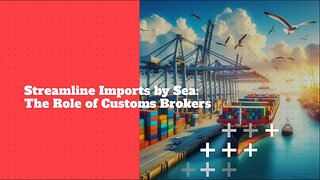 4:16
4:16
ISF Solution
2 months agoDemystifying Customs Regulations: How Customs Brokers Simplify Importing by Sea
1 -
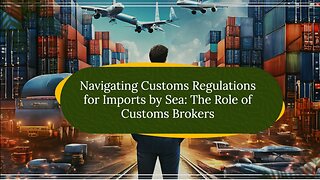 4:22
4:22
ISF Solution
2 months agoThe Essential Guide to Customs Brokers: Navigating Import Regulations Made Easy!
1 -
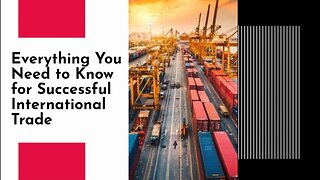 3:06
3:06
License To Import
2 months agoStay Compliant with Importer Security Filing and Unlock Smooth Customs Clearance
6 -
 3:18
3:18
ISF Template
2 months agoStreamline Your Imports: Navigating the Role of Customs Brokerage in the USA
3 -
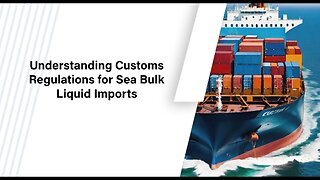 4:43
4:43
ISF Solution
2 months agoThe Expert Guide to Customs Regulations for Imports by Sea Bulk Liquid Transport
1 -
 4:09
4:09
ISF Checklist
2 months agoUnlocking the Secrets of ISF-102 Compliance: A Comprehensive Guide for Importers
5 -
 4:16
4:16
ISF Checklist
2 months agoNavigating Importer Security Filing Challenges: Strategies for Smooth Compliance
2 -
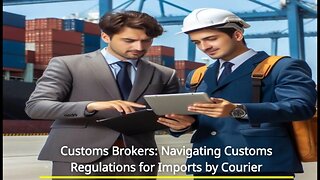 4:12
4:12
ISF Solution
2 months agoMaximizing Efficiency: How a Customs Broker Can Streamline Imports by Courier
4 -
 3:25
3:25
ISF Checklist
1 month agoThe Essential Role of Customs Brokers: Managing Customs Compliance Documents
2